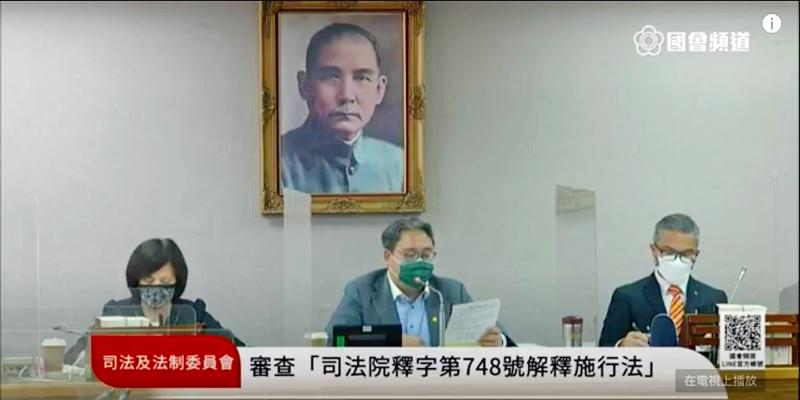An amendment to grant same-sex couples the right to jointly adopt children passed a preliminary review yesterday at the legislature’s Judiciary and Organic Laws and Statutes Committee, bringing the law one step closer to closing an oversight criticized by LGBTQ+ and children’s advocates since the passage of same-sex marriage in 2019.
The amendment to Article 20 of the Act for the Judicial Yuan’s Implementation of Constitutional Interpretation No. 748 (司法院釋字第七四八號解釋施行法) is to enter cross-party negotiations.
The amendment aims to grant same-sex couples the right to adopt jointly and for a partner to legally adopt their spouse’s adopted child, bringing their rights in line with those afforded to different-sex couples under the Civil Code.

Photo: Hsieh Chun-lin, Taipei Times
The act as it stands only allows for a same-sex partner to adopt their spouse’s biological child.
Since the law was passed in May 2019, 7,757 couples have registered marriages.
“At that time, we were the first in Asia” to legalize marriage equality, Democratic Progressive Party Legislator Cheng Yun-peng (鄭運鵬) said. “Three years later, we are still the only ones. Now it is time for Taiwan to take care of the next generation.”
Deputy Minister of Justice Chen Ming-tang (陳明堂) told legislators at the committee meeting that the authors of the 2019 law were facing a few points of contention.
First was a debate over using a dedicated law rather than changing the Civil Code, as LGBTQ+ advocates said it would mark them as different, Chen said.
They also had to use the term “permanent union for the purpose of living a common life” rather than “marriage” to appease opponents and align the law with the referendum results from the year before, he said.
At the time, there were also reservations over the hotly debated issue of adoption rights, he said, adding that the original wording was not meant to restrict same-sex couples.
However, after three years, it is time to legally protect the children of same-sex couples, he said.
The law as it was originally written denies parents certain crucial rights, he said.
For example, only a biological parent is eligible to take parental leave and has medical power of attorney, and in the event that a biological parent dies, their partner would have no right to their child, he said.
All of these circumstances have arisen since 2019, Chen said, adding that the government has the obligation of protecting these rights.
Given that adoption is a contractual agreement, Cheng said that the court has the right to revoke a person’s parental rights if it deems them unsuitable, regardless of gender.
The Ministry of Justice in its report to the committee cited a government-commissioned survey showing that attitudes toward LGBTQ+ issues have improved since the law was passed.
In 2018, only 37.4 percent of respondents supported marriage equality, but the figure climbed to 52.5 percent in 2020 and 60.4 percent last year.
Attitudes toward adoption rights have also improved, with 53.8 of respondents approving in 2018 and 67.2 percent last year.
Asked whether same-sex couples could raise a child as well as different-sex couples, 56.2 percent of respondents agreed in 2018, while 72.2 percent agreed last year.

Chinese Nationalist Party (KMT) Chairman Eric Chu (朱立倫), spokeswoman Yang Chih-yu (楊智伃) and Legislator Hsieh Lung-chieh (謝龍介) would be summoned by police for questioning for leading an illegal assembly on Thursday evening last week, Minister of the Interior Liu Shyh-fang (劉世芳) said today. The three KMT officials led an assembly outside the Taipei City Prosecutors’ Office, a restricted area where public assembly is not allowed, protesting the questioning of several KMT staff and searches of KMT headquarters and offices in a recall petition forgery case. Chu, Yang and Hsieh are all suspected of contravening the Assembly and Parade Act (集會遊行法) by holding

PRAISE: Japanese visitor Takashi Kubota said the Taiwanese temple architecture images showcased in the AI Art Gallery were the most impressive displays he saw Taiwan does not have an official pavilion at the World Expo in Osaka, Japan, because of its diplomatic predicament, but the government-backed Tech World pavilion is drawing interest with its unique recreations of works by Taiwanese artists. The pavilion features an artificial intelligence (AI)-based art gallery showcasing works of famous Taiwanese artists from the Japanese colonial period using innovative technologies. Among its main simulated displays are Eastern gouache paintings by Chen Chin (陳進), Lin Yu-shan (林玉山) and Kuo Hsueh-hu (郭雪湖), who were the three young Taiwanese painters selected for the East Asian Painting exhibition in 1927. Gouache is a water-based

Taiwan would welcome the return of Honduras as a diplomatic ally if its next president decides to make such a move, Minister of Foreign Affairs Lin Chia-lung (林佳龍) said yesterday. “Of course, we would welcome Honduras if they want to restore diplomatic ties with Taiwan after their elections,” Lin said at a meeting of the legislature’s Foreign Affairs and National Defense Committee, when asked to comment on statements made by two of the three Honduran presidential candidates during the presidential campaign in the Central American country. Taiwan is paying close attention to the region as a whole in the wake of a

OFF-TARGET: More than 30,000 participants were expected to take part in the Games next month, but only 6,550 foreign and 19,400 Taiwanese athletes have registered Taipei city councilors yesterday blasted the organizers of next month’s World Masters Games over sudden timetable and venue changes, which they said have caused thousands of participants to back out of the international sporting event, among other organizational issues. They also cited visa delays and political interference by China as reasons many foreign athletes are requesting refunds for the event, to be held from May 17 to 30. Jointly organized by the Taipei and New Taipei City governments, the games have been rocked by numerous controversies since preparations began in 2020. Taipei City Councilor Lin Yen-feng (林延鳳) said yesterday that new measures by